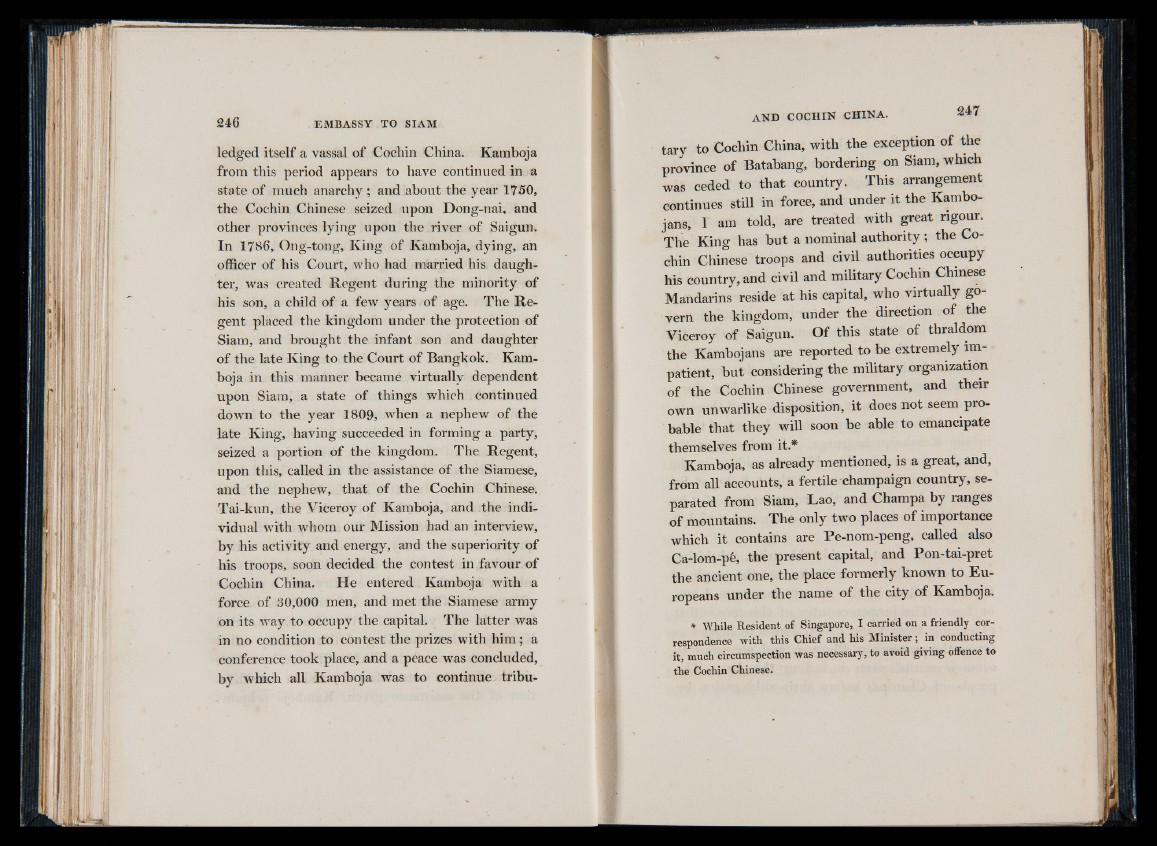
ledged itself a vassal of Cochin China. Kamboja
from this period appears to have continued in a
state of much anarchy; and about the year 1750,
the Cochin Chinese seized upon Dong-nai, and
other provinces lying upon the river of Saigun.
In 17S6, Ong-tong, King of Kamboja, dying, an
officer of his Court, who had married his daughter,
was created Regent during the minority of
his son, a child of a few years of age. The Regent
placed the kingdom under the protection of
Siam, and brought the infant son and daughter
of the late King to the Court of Bangkok. Kamboja
in this manner became virtually dependent
upon Siam, a state of things which continued
down to the year 1809, when a nephew of the
late King, having succeeded in forming a party,
seized a portion of the kingdom. The Regent,
upon this, called in the assistance of the Siamese,
and the nephew, that of the Cochin Chinese.
Tai-kun, the Viceroy of Kamboja, and the individual
with wrhom our Mission had an interview,
by his activity and energy, and the superiority of
his troops, soon decided the contest in favour of
Cochin China. He entered Kamboja with a
force of 30,000 men, and met the Siamese army
on its way to occupy the capital. The latter was
in no condition to contest the prizes with him ; a
conference took place, and a peace was concluded,
by which all Kamboja was to continue tributary
to Cochin China, with the exception of the
province of Batabang, bordering on Siam, which
was ceded to that country. This arrangement
continues still in force, and under it the Kambo-
jans, I am told, are treated with great rigour.
The King has but a nominal authority; the Cochin
Chinese troops and civil authorities occupy
his country, and civil and military Cochin Chinese
Mandarins reside at his capital, who virtually govern
the kingdom, under the direction of the
Viceroy of Saigun. Of this state of thraldom
the Kambojans are reported to be extremely impatient,
but considering the military organization
of the Cochin Chinese government, and their
own unwarlike disposition, it does not seem probable
that they will soon be able to emancipate
themselves from it.*
Kamboja, as already mentioned, is a great, and,
from all accounts, a fertile champaign country, separated
from Siam, Lao, and Champa by ranges
of mountains. The only two places of importance
which it contains are Pe-nom-peng, called also
Ca-lom-p6, the present capital, and Pon-tai-pret
the ancient one, the place formerly known to E u ropeans
under the name of the city of Kamboja.
* While Resident of Singapore, I carried on a friendly correspondence
with this Chief and his Minister; in conducting
it, much circumspection was necessary, to avoid giving offence to
the Cochin Chinese.